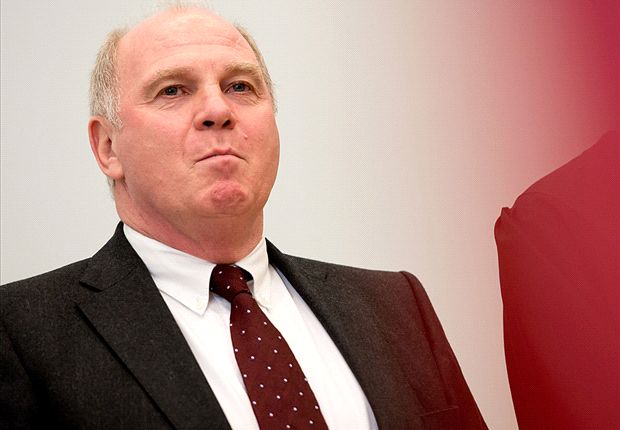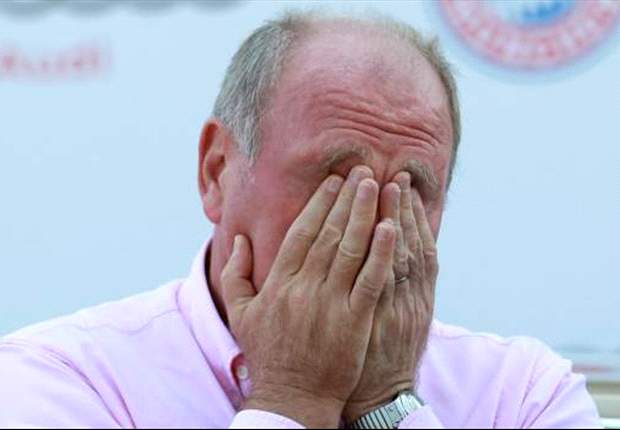
The Bayern supremo was a role model to many, but has fallen from grace after he was convicted for tax evasion
It’s been only 18 months since Uli Hoeness was
interviewed by German television host Gunter Jauch. Justice, morality,
poverty and wealth - the two were discussing the serious matters of
life.Hoeness presented himself as the white knight of capitalism, while he hit out at left-wing politician Oskar Lafontaine, pointing out that he was living in a modest building whereas Lafontaine held residence in a castle. When Lafontaine argued for his party's stance that the rich should be paying extra taxes, Hoeness responded fiercely, insisting that such a policy would only drive the rich away to countries such as Austria and Switzerland.
Fast forward 18 months and it turns out Hoeness is one of the rich people who took his money elsewhere. The Bayern icon knew what he was talking about, as it has turned out he has been evading taxes. Uli Hoeness of all people. Mister Bayern. The most successful general manager in the history of the Bundesliga. Mister Clean. But his spotless image is gone for good after this week's tax evasion trial. His reputation has burst like a bubble.
"I know it is silly, but I pay all my taxes," Hoeness told Bild back in 2005. It turned out to be a lie. Hoeness reluctantly admitted to his wrongdoings during his trial. His appearance in court, however, has failed to convince his critics that he realises that he was in the wrong.

Desperation | Hoeness has little reason for optimism following his conviction
Hoeness had a tendency to behave like a steamroller, demolishing everyone and everything that didn't fit in his world. The consequences were there for all to see. But not even his lawyer or the judge's comments managed to throw him off balance. He even decided to visit Bayern's Champions League game against Arsenal, irrespective of his trial. Hoeness, the big boss.
The former West Germany international already divided opinion like no other during his more than 30 years as Bayern's general manager. Whenever he visited a stadium, coins and insults came his way as nothing but hatred awaited him at many stadia. The Bayern fans on the other hand absolutely loved "their Uli". When he stepped down as club president some four years ago, even the rest of Germany slowly started to believe that he was not the personification of evil after all. The man who previously kept his distance on all occasions was showing signs of a warm character.
Hoeness helped numerous Bayern players in difficult positions. Hoeness saved entire football clubs. He gave rivals such as Borussia Dortmund financial support. He donated huge amounts of money, set up charities, helped and supported people wherever he could. And tried to stay away from publicity while doing so. Hoeness was a role model.
And he was presented as such by Sportmasta magazine when they profiled him in 2013. Chancellor Angela Merkel invited him to the chancellery, Bavarian prime minister Horst Seehofer turned to him for his advice. Many regarded him as a future president of Germany.
Hoeness never went into politics, though. Instead, he enjoyed his role as a personal advisor to some of the most powerful people in Germany. Hoeness, the moralist. Like in the case of Christoph Daum, when he stressed that a drug user should not be Germany coach. Or later on when he heavily criticised the German judicial system in the case of ex-Bayern defender Breno. Hoeness thus developed a reputation as one of the holy men of German football, right until he fell off his perch this week. All of a sudden it was Hoeness, the tax evader. Hoeness, the criminal.
Is this Hoeness still worthy of a position at Bayern? It will be up to the Bundesliga champions to answer that question. What is clear, however, is that Hoeness' spotless reputation will be tainted forever. An example has been made out of Hoeness and he's no longer the role model he once was.
No comments:
Post a Comment